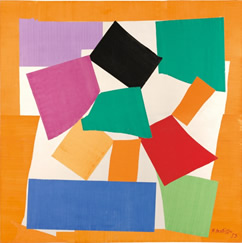
Letter from London: May 2014
By Kathleen Dimmick
If these remembered pleasures of the London theater in May were gathered together in a scrapbook, the cover would have to be one of Matisse's late cut-outs from the exhibit at the Tate Modern. His exquisite rendering of human desire and spirituality captures the very essence of great theater. And the museum itself confirms the conceit: located in the former Bankside Power Station with its iconic smokestack and stunning turbine hall, it represents the brilliant conversion of one type of utility for another, just as great plays from the past are re-envisioned to startle and provoke contemporary audiences.
For sheer freshness of re-invention, Ivo van Hove's production of Arthur Miller's A View from the Bridge at The Young Vic stood out. Several of van Hove’s productions seen over the years at New York Theater Workshop -- Williams's A Streetcar Named Desire, O'Neill's More Stately Mansions, and Hellman's The Little Foxes – testify to his facility for blowing the dust off American classics. The Flemish director's distance from the English language and from the language of 20th-century American naturalism allow him to hear these plays in a new way, bringing a strong physicality to conventional psychological development and expression. (A similar physicality and inventiveness brought to Moliere's The Misanthrope, also at the Workshop, was not as successful, creating the impression that van Hove responds more fully to a naturalistic idiom than to the highly stylized vocabulary of 17th-century neoclassical comedy.)
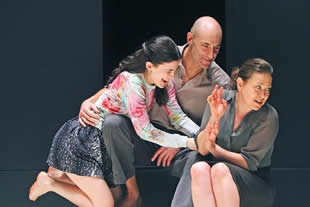
Led by a startling performance from Mark Strong as Eddie, this was an essentialized version of Miller's drama, stripped not only of decor but also of traditional character psychology. Eddie's relationship with his niece Catherine, the excellent Phoebe Fox, was indeed physical. She leapt unselfconsciously onto her uncle’s chest, wrapping her legs around his waist, and delighted in crawling around on all fours, her panties in full view of Eddie and the audience. In another innovation, the arriving cousins from Italy did not use the heavily accented, broken English common to most productions, but spoke the same vernacular as Eddie and his family. The often awkward presence of the lawyer Alfieri as narrator and witness was here handled with subtlety; drifting barefoot in and out of the action, he mostly observed from an upstage perch. The other actors, also barefoot, often sat watching on a slightly elevated ledge that formed the rim of a rectangular playing area that, by the end of the play, had the feel of a bloody cockfighting pit. The striking, minimal set was designed by van Hove's long-time collaborator Jan Versweyveld.
Eddie's passion for his niece and his jealousy over her new-found love for the immigrant Rodolfo became a torment for all: van Hove's physical approach discovers the acute gesture that manifests that tension but doesn't reduce the psychological subtext in naturalistic plays. The formidable naked wrestling match between Sara and Simon in More Stately Mansions that literalized their psychic quarrel was a good example. In View, the result is a deepening justification of Miller's reach for modern tragedy -- the conflict engendered by a dockworker's obsession with his niece touches the mythic.
Two productions at the National Theatre were also revelatory: Shelagh Delaney's A Taste of Honey (1958) and Sean O'Casey's The Silver Tassie (1929). Written two years after John Osborne's Look Back in Anger, Delaney's play shares the “kitchen sink” milieu of a shabby flat in provincial England but proved to be something quite different from the plays written by the grammar-school-educated group of Angry Young Men. The story of the warfare between a pregnant teenager and her roving single mother was a sensation; at twenty, Delaney became Britain's first working-class female playwright. In the National's production, directed by Bijan Sheibani with a massive, free-floating set by Hildegard Bechtler (sharing the stage of the Lyttelton in rep with Tassie), the originality of Delaney's voice was instantly arresting, in part due to the poetry of the northern dialect -- a boisterous, rhythmic argot as far from the King's English as one could imagine. As with the actors at the Young Vic, the company was strong, in particular the dynamic performances of the mother and daughter, played by Lesley Sharp and Kate O'Flynn. As their gloves-off battles rose and fell, punctuated by the mother's unsurprising disappearance and reappearance just in time to usurp the stable care and attention provided by her daughter's homosexual flat mate, we come to feel and understand the deeper, which is not to say healthier, bond between the two women. With the superb acting and attention to language, this play felt fresher than most of the plays from the Angry male generation of the late 1950s. As Jeanette Winterson noted in the program: “Taste of Honey has none of the bitterness of Osborne, but the laughs aren't the epigrammatic knock-about lines of Joe Orton either. Delaney had what Alan Bennett put to such good use later: a subtle way of turning the moment from pain to laughter and back again.”
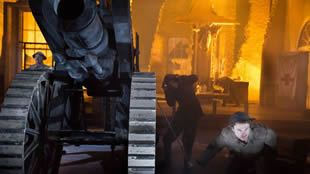
O'Casey submitted The Silver Tassie to the Abbey Theatre during the successful revival of The Plough and the Stars. Yet at the very moment audiences were cheering that production the theater rejected Tassie, with W.B. Yeats himself leading the objections, writing to O'Casey: "You are not interested in the Great War; you never stood on its battlefields or walked its hospitals, and so write out of your opinions. You illustrate those opinions by a series of almost unrelated scenes as you might in a leading article." In a fit of pique, O'Casey published the correspondence related to the rejection; this backfired (as these dust-ups often do) consigning the play to a lesser status than his trio of plays set during the Irish revolution of 1916-23: The Shadow of a Gunman, Juno and the Paycock, and The Plough and the Stars.
Apart from issues of personal rivalry and attitudes about the war, it was clear that Yeats did not respond to O'Casey's experiment in dramatic form. The play opens with a conventional "Irish color" scene: men sitting around drinking and bragging about football and the imminent departure of local star Harry Heegan (Ronan Raftery) as the women work and various local characters are introduced. The act ends with Harry going off to enlist. Act Two shifts to the battlefield, where an aggressive sound score, extensive choral interludes, and a ghostly, apocalyptic landscape by Vicki Mortimer introduce us to an expressionist vision of men in a new kind of war – mechanized slaughter, confusion in the ranks, traumatic injury – a chaos where no rules pertain. O'Casey's powerful break in style and dramaturgy clearly troubled Yeats and others, who mistook a bold theatrical experiment for a failure to properly execute the conventions of the well-made play.
Acts Three and Four return to more realistic representation, first in a hospital ward and then a party at the football club. Having lost his legs along with his football career and beautiful girlfriend, Harry is filled with bitterness that taints the increasingly desperate attempts at celebration; no sentimental resolution can cover the brutal vision of war created by Act II. With the generous resources of the National, Howard Davies's production felt like a powerful re-discovery of O'Casey's neglected play.
Down the Thames at The Globe, a vigorous production of Titus Andronicus defied different expectations. The Globe has been known for spotty work that panders to the heavy tourist scene; this Titus certainly pandered but happily in the best Shakespearean sense -- by turning the audience, and especially the groundlings in the pit, into the Roman populace. The standing spectators were man-handled by moving platforms carrying politicians vying for the throne. Water and wine flew; inventive bloodshed alternately horrified and thrilled the crowd. But the language of the play was not short-changed; Titus, played by William Houston, set the tone with powerful focus, clarity and intent. David Shaw-Parker played an interpolated Bacchus as a jocose pander, seducing the audience (with text from who knows where) with the dangers and pleasures of drink and the flesh in wonderfully inclusive ways. Obi Abili's powerful Aaron personified the fully conscious villain -- an early version of Iago -- despite an occasional knowing wink to the audience as characters showed up on cue to be murdered and bodies filled the stage. Nonetheless, the intense theatricality of Lucy Bailey's production (first staged in 2006) justified, against centuries of critical carping and neglect, Titus Andronicus as a vibrant work for the stage.
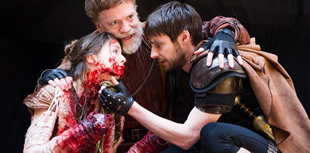
Birdland, by Simon Stephens, playing at the Royal Court, was directed by Carrie Cracknell, whose staging of Ibsen's A Doll House was recently seen at BAM. Stephens is a prolific writer. His adaptation of Mark Haddon's The Curious Incident of the Dog in the Night-Time transferred last season from the National to the West End. Birdland featured Andrew Scott (of villainous Sherlock fame) as a down-spiraling rock star, loaded with more repressed guilt and unleashed anomie than drugs and alcohol. While Scott's performance was fairly nuanced and the production, designed by Ian MacNeil, was striking, the rock star's trajectory of betrayal, narcissism, and parental neglect felt overly familiar. And while the set made good use of the Royal Court's intimate stage, the by now de rigueur scenic spectacle -- here the inundation of the stage with water -- felt like yet another attempt to resolve and deepen a play by extra-textual means. Not quite earned, the spectacle served to provide a scenic closure to a play that felt adrift.
Which brings us to the Spring’s hottest ticket: Mike Bartlett's King Charles III at the Almeida, directed by Rupert Gould. Known in New York for his recent play Cock, Bartlett fashioned a politically acute cautionary tale about what might play out should Charles finally ascend the throne. Bartlett's ambition and strategy in fashioning a Shakespearean history play are clear: writing in blank verse -- for the most part quite successfully ("My life has been a Ling'ring for the throne") -- achieved a heightened diction, lending an elevated stature to his examination of contemporary British ambivalence toward their royals. Despite the fascinating premise, however, the play suffered from some awkward dramaturgy and from a production that, surprisingly, did not always serve the play well. Some story lines, particularly that of Harry and his passion for a punk commoner, felt overly conventional and skirted plausibility. And casting the notable Tim Pigott-Smith turned out to be a mistake; he seemed unable to adequately (or fairly?) energize Charles, with the result that his initially quite reasonable concerns about the freedom of the press fell far too quickly into the illogical and paranoid ramblings of a feeble old man. Charles's tenure was never allowed to build into a real threat; he was no match for the sophisticated William and Kate, both well-versed in the necessary machinations of power.
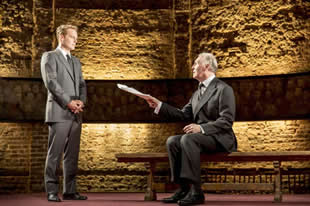
Regarding freedom of the press: a visit to the Rebekah Brooks trial at the Old Bailey offered politically engaged theater of an entirely different sort. The phone-hacking scandal at the News of the World resulted in the arrest of Brooks, at the time CEO of News International, on charges of conspiracy and corruption. There were more bewigged barristers than there were spectators in the decidedly déclassé Old Bailey courtroom (the trial has been grinding on since October). But there behind bullet-proof glass was the star, the red-tressed Rebekah, along with Andy Coulson, her former lover -- both with close ties to David Cameron and Tony Blair -- chaperoned by a pair of guards. A mostly attentive jury, court reporters and the judge filled out the cast. Dickensian stacks of papers and binders rising to the ceiling bore witness to the complexity and longevity of the case. The scene resembled something from Gilbert and Sullivan's Trial by Jury, directed and designed by those famous hoarders the Collyer brothers. As of this writing, the arguments are concluded and the case has been sent to the jury.
Trials are a form of theater of course, but seeing the Brooks trial and King Charles III in close succession reinforced the notion that true theater occurs when an engaged audience confronts an imaginatively conceived version of its own powerful myths and the very real underside of such power. One felt a vibrant relation between art and culture in today's London, from Matisse's cut-outs at the Tate to Renzo Piano's "Shard," now the tallest building in the European Union. The city seemed energized by its very éclat, pleased with being the international hub of finance and culture. At the theater, from King Charles III to O'Casey, Delaney and Miller to bloody Shakespeare, there was never a question of why this play now; the communication between the audience and the stage felt absolutely current.
